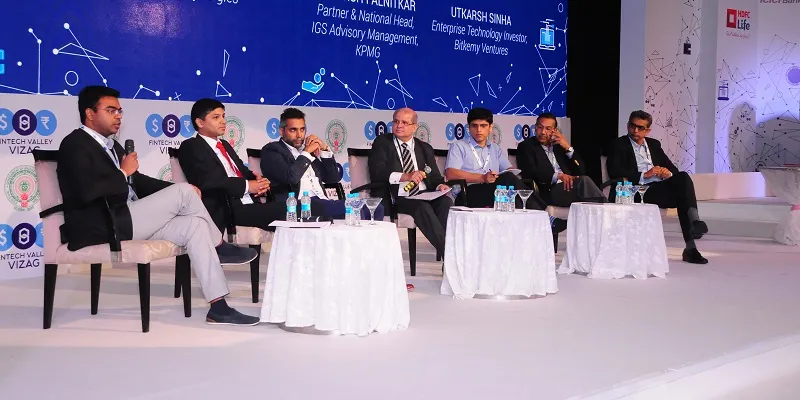What do investors really think about funding in fintech?
Financial technology and services might just be the flavour of the season. A simple glance at the deals being struck and the money flowing into the segment would be enough to convince one of that. According to a report released by industry body NASSCOM and advisory major KPMG, the fintech market in India soared past $1.2 billion in 2016 and is projected to hit $2.4 billion by 2020.
According to data from YourStory Research, the Indian financial startup ecosystem saw more than $687 million poured into the space across 88 deals in 2016. And if we were to exclude the massive $575 million investment of Alibaba-backed Ant Financial Services Group in Paytm’s parent company, One 97 Communications, made in 2015, the sector can be shown to have experienced an 81 percent rise in deal value last year.

But what does this aggressive deal flow really mean to an investor?
Telling us were financial services industry leaders at the Spring Conference 2017 organised by the FinTech Valley Vizag, the Andhra Pradesh government’s flagship initiative for building a sizeable fintech ecosystem in the state.
The panel was moderated by Utkarsh Palnitkar, Partner and National Head, IGS Advisory Management, KPMG.
Speaking on the occasion was Sampath Iyengar, General Partner, Forum Synergies, who stated that financial technology businesses can be divided into two very distinct groups.
The first consists of those businesses where financial services are riding on technology; this is a sector which represents higher risks and for which regulations are still evolving. The second group, meanwhile, is made up of businesses where technology is riding on financial services, which we see in the areas of robo-advisory and cryptocurrency.
According to Sampath, these are still early-stage businesses, with a lot to prove to the market.
When asked which sector in financial technology has received the maximum interest, Sampath quickly points towards payments. He says,
“There has been a tremendous amount of investment in payments, owing to the fast innovation in the space. Also, it continues to be quite inefficient as a function, especially in banking. For example, cross-border payments are all over the place. Thus, there is still a lot of scope for innovation in this space.”
However, has there been a considerable impact on the industry with the recent demonetisation?

Abhinav Chaturvedi, Principle with Accel Partners, which invests in consumer and business financial services, said,
"There might be a short-term negative impact amongst our portfolio companies. There was an obvious spike in usage for payment firms, with activities and metrics for lending firms also seeing some uptake. However, we still have to see whether the money lent will come back; but all in all, the financial services market has seen a new normal, at least in terms of metrics."
Speaking about deal sizes, Abhinav later stated that the average ticket size for investments in the space ranges between $200,000 and $500,000 for a business at the seed stage, whereas businesses with a proof of concept see an average investment deal size between $1 million and $3 million.
And for businesses looking for growth capital, the average ticket size can go into the double-digit millions. This points to the possibility of there being different investors for different stages of funding.
But when we talk about support to our financial business ecosystem, is there something that India is missing?
To this, Puneet Pushkarna, Chairman, TiE – Singapore, remarked,
“There might be some initial ignition missing for startups to see the daylight, and Singapore might be helping in that direction. The Singapore government has even made funding available to startups.”
To this, the Special Chief Secretary and IT Advisor to the AP Chief Minister, JA Chowdary, was quick to point out that, through the FinTech Valley initiative, the Andhra Pradesh government might be setting up a Rs 100 crore fund for financial technology startups. Also, this event provides the opportunity to participate in the $1 million global fintech award challenge and the Rs 1 crore Indian fintech award challenge, both hosted by the Andhra Pradesh government.

But according to Puneet, what the government can really do is create market access, which continues to be an even bigger challenge for financial services companies than raising investment.
So, is there an active deal flow when we look at financial services startups in the country?
Prasad Vanga, Founder and CEO, Anthill Ventures, told YourStory,
“There is an active deal flow for investments when we talk about financial services. However, one needs to understand that one will not readily invest in already existent technologies and business models. No one will invest in another payment gateway or wallet. So, what we are looking at essentially are unique value-add solutions. Additionally, at Anthill, we look at horizontal-focused businesses like enterprise SaaS, rather than vertical-focused businesses.”
PS Sreekanth, Investment Director, Hyderabad Angels, completely agrees with the above statement. Citing to YourStory some favourable sectors for investment, he said,
“We think that cybersecurity and blockchain are some of the interesting sectors to invest in. The fact that there is no regulation makes these sectors nascent, with a bigger scope for innovation. But the interest in fintech has only been growing over the past three to four years.”
Amongst the companies on the panel, Anthill Ventures, Forum Synergies, and Hyderabad Angels signed a Memorandum of Understanding (MoU) with the FinTech Valley Vizag initiative to provide access to the capital market, mentorship, operational support, as well as other support to the startups incorporated under the initiative.







